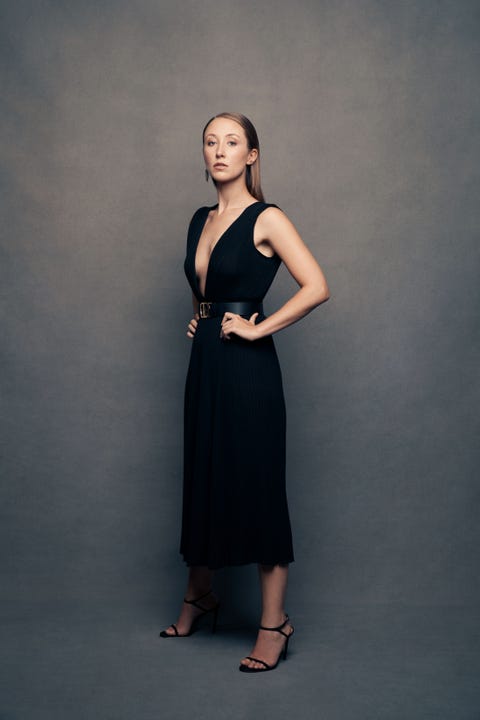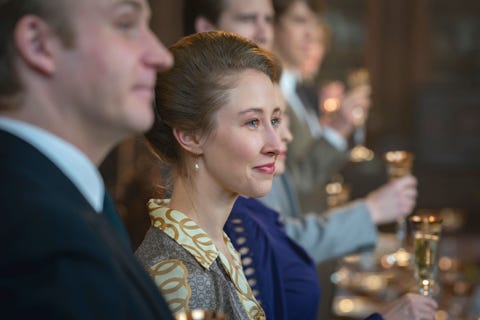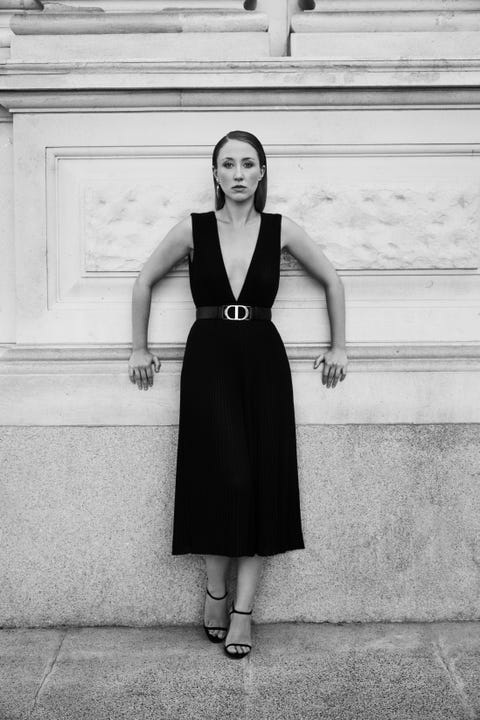I have three words for Erin Doherty: Princess Anne spinoff.
“Oh! I'd love to do that,” the 28-year-old Brit's voice sails over the phone. “You let me know the time and
place, and I'm there.”
It's a prospect worth considering for The Crown creator Peter Morgan. Doherty’s iteration of Princess Anne captivated audiences when she made her season 3 debut last year: The princess's wry commentary and withering asides, encased in a clipped monotone spoken through the nose, gives the oft-ridiculous weight of royal life and protocol a sense of reality. While the rest of the family masks indiscretion with a polite cough, the princess tells it like it is—a literal exhale inside a machine where, it seems, everyone else is holding their breath. For Anne, it's a coping mechanism for a life lived on the periphery of the throne. For Doherty, it was simply a lot of fun: "I learn the lines, rock up on set, and just be brutally honest with people," she laughs.
This season, Anne’s polar exterior belies an open wound: Her marriage isn’t working, the press hates her, and she has to contend with the arrival of the royal family’s new superstar, Princess Diana. When the queen manages to show some interest in her only daughter's life, it's with a quiet dismay. You can practically hear the unofficial royal family motto, “Never complain, never explain” ringing through the scene as she confronts Anne’s infidelity: sideways, with little admonishment other than an expectation of the affair's conclusion. The ensuing back-and-forth—snappish, never quite clawing through Anne's deep unhappiness—is a naked display of the princess's vulnerability, and a tour de force performance from Doherty. It's also a bit unsatisfying: Why haven’t we had more time with the princess in the run-up to this moment? Why haven't we seen more Doherty?
It’s one of The Crown’s biggest flaws: There's simply not enough time for a show about the British sovereign to explore the monarchy's many supporting characters. Which brings us back to my initial pitch: No one else could—or should—be Princess Anne. "Oh well, someone's going to be," Doherty reminds me. The actress’s time is up—she got her two seasons, and it's time for an older actress to pick up the role for The Crown's final 20 episodes. Surprisingly, Doherty's ready. "I'm actually looking forward to it. I've fallen in love with this woman, and I want to see her onscreen as much as everyone else who's been watching her," the actress explains. "I can't disassociate from the fact that it's me, so I'm genuinely excited about seeing someone else do it."
Below, Doherty breaks down that scene in episode 4, "Favourites," the set's party atmosphere, and why she's delving into psychology.
Did you approach season 4 any differently from season 3?
I feel like I spent the whole of season 3 absolutely wetting myself with fear, so I spent this time around actually having a nice time. I look back and think, “Oh yeah, I thoroughly lapped up every minute of it.” There was this looming sense that it was our last go.

You can tell there's more strength to everyone's relationships this season.
The first three episodes when we're at Balmoral, and all the Christmas scenes, all those games, that is genuinely us having a laugh. We started the shoot in Scotland, we were there for months on end, so at the end of every day, we were going ‘round to each other's little places, eating food, drinking wine, watching Naked Attraction. Olivia Colman, Marion Bailey, we were all there chatting about this wonderful show. That was our life for months on end, so those [scenes] are genuinely us having a good time.
How does season 4 Anne differ from season 3?
This season is the payoff of the previous season. What you've built is this formidable woman who seems to be this unbreakable, unshakable force. And actually, this season, you get to see what's going on inside and beneath the surface of what seems to be calm. I bloody loved every minute because it felt so essential for people's understanding of who she is and what she's made of.
The scene where Anne admits her internal struggle to the queen in episode 4 feels like the crux of this journey. How did you react to seeing that in the script?
I was like, "This is going to be my favorite moment in this whole period of my time." And it actually was. As an actor, when I first read about this woman and was finding out all these amazing things about her being kidnapped and saying "No," I was like, "Who is this woman?" And then you get to that scene in episode 4, and you go, "God, that's who she is." She's desperately trying to be this strong-willed iron woman. You see her reach out for her mom, and her mom doesn't quite know how to deal with it. It's heartbreaking, but it's so human. You witness someone be a human being. It really was my favorite moment in the whole show.
Last year, you told me you wanted to ask the real Princess Anne about her relationship with her mom. Now that you’ve finished playing her, how do you describe your character’s relationship with Olivia’s queen?
I don't know if there is anything more off-balancing as wanting your mom to be there and she absolutely cannot be. That is such a strange footing to start on with potentially the most important relationship of your life. My perception of it, in Peter Morgan's version, anyway—I have no idea what's going on inside the real Anne's head—is that completely shapes the person you become. It shapes how you communicate with people, how much you give away, how much you're willing to trust. It basically made Anne go, "Right, well, I'm going to take care of myself then." And that’s where that armor came from. So to then see the relationship years later, with Anne having her own children and still attempting to reach out to her mom in her time of need and not get what she wanted, it's the epitome of the situation they're in. It drives home the fact that we look at these people and think they have these magnificent lives, but they actually don't have the basic things we all want. It's such an empty, lonely existence.

How do you put yourself in that space? Do you walk off set and physically shake off that feeling?
The only way I really enjoy working is to completely submerge myself in these people's lives. It does take a good couple of weeks to shake it off. Even letting go of the fact that I would never be playing her again—I said that out loud for the first time in September. It took me that long to go, Oh, right. I don't have to think about the way this woman thinks anymore. Your body gets into a rhythm and it takes a while. I would sit off set and still be in that emotionally distanced place.
Did you catch yourself talking in the accent in real life?
I was called out on it all the time by my family. They'd be like, "That's not your voice." Now, even some words I'm like, "That's not my voice."
You basically have to exorcise Princess Anne from your body.
I've never played someone for this long before, so I've never really had to deal with this. It's taking a while to leave my body.
Do you find the same goes for when you perform onstage?
In a sense, because that's what I grew up doing and where I feel most at home. It goes times 10 for me when I'm doing a character in a play, because more often than not, you relocate to wherever you're doing this play, so you tend to be living alone, going home, eating, sleeping, reading this play. You never drop it because it’s for such a confined amount of time. Whereas the filmmaking is spread out and you end up going home in between, and you learn how to inhabit it and drop it.
Talk to me about the characterization of Anne this season. She’s the voice of reason for the family now.
We laid the groundwork for her to be that way in season 3, particularly with her and Charles. In our version of events, they have always had that relationship. What happens this season is you see Josh as Charles really, really struggling to make a decision and Anne is there to push him forward or shake him in some way. That felt very organic and necessary. But that’s just Anne's personality. I think she’s actually incapable of lying. She just can't offer up anything else.

Were you conscious of having to lay the groundwork for this next generation of royals?
I wasn't too aware of it because it seems to be such a family-oriented show. Yes, our role is completely necessary and essential to the dialogues that are happening, but so are Olivia, and Helena and Tobias—all those people chiming into the conversation are absolutely essential. And that is actually the secret weapon of the show: You've got these generations of people confusing each other and miscommunicating.
A few weeks of shooting got cut due to the pandemic. Had you already wrapped by then?
We were really, really lucky. I think we only had a couple of little bits to do, but we managed. It wasn't essential. I had my last day on set with a bunch of other people the week before we went into lockdown. It was so much fun; we were filming this Christmas scene and all dancing around, having drinks, and because we'd spent so much time together, it was effortless. And then the end of the day came and we all said goodbye. None of us knew what we were heading into in terms of months and months of lockdown.
How did you spend lockdown?
In my own strange, baffling way, I learned how to juggle, which did keep me very sane. It feels like a kind of meditation.
I'm a bit of a read-aholic. I've started reading a lot of psychology books. I've been reading a lot of Freud. I love human beings and I'm fascinated why we do the things we do. And as an actor, our job is to basically legitimize someone's actions, regardless of whether or not you think that it would actually happen. My job is to accept that anyone could do anything at any time because they believe it's the right thing to do.
